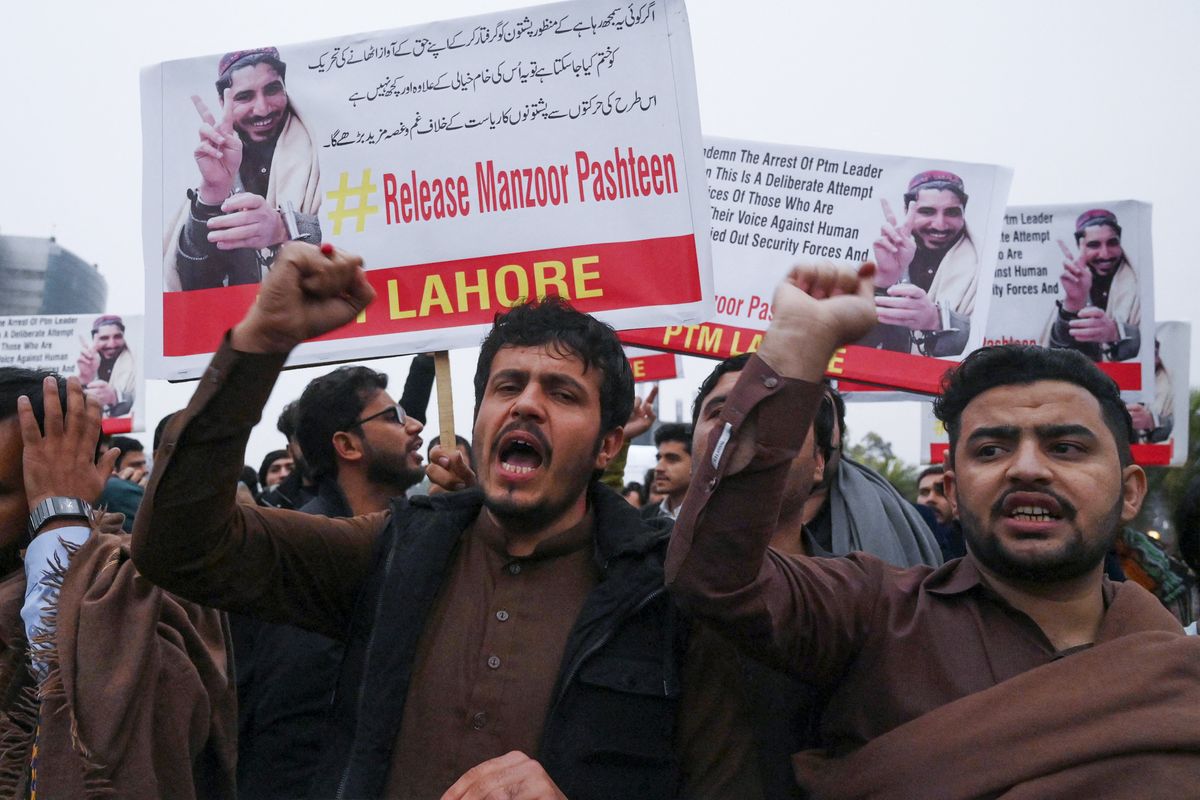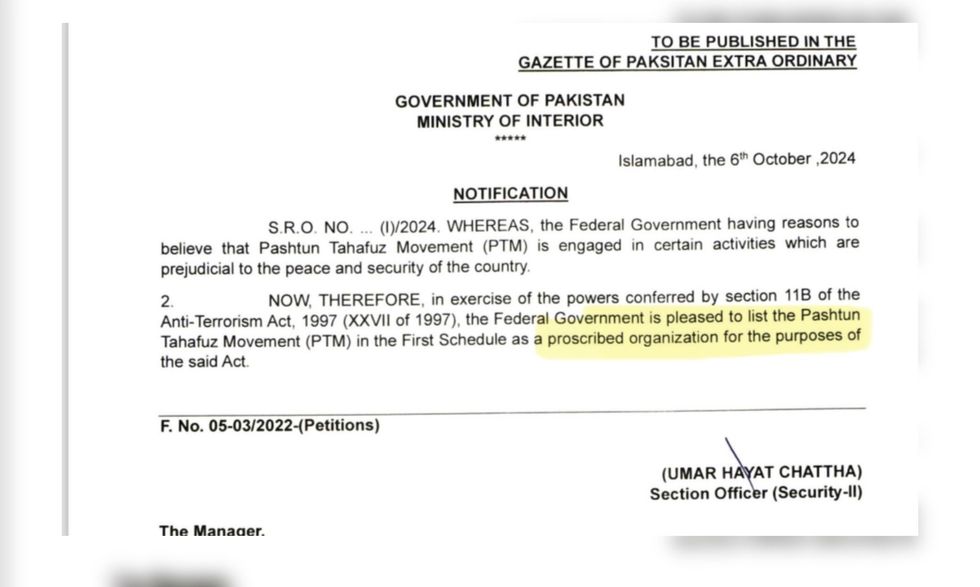Pakistani govt bans Pashtun rights group over ‘security concerns’
Interior ministry cites activities 'harmful to the country’s peace and security' for decision, although no specific actions were named
News Desk
The News Desk provides timely and factual coverage of national and international events, with an emphasis on accuracy and clarity.

Javed Hussain
Correspondent
I have almost 20 years of experience in print, radio, and TV media. I started my career with "Daily Jang" after which I got the opportunity to work in FM 103, Radio Pakistan, News One, Ab Tak News, Dawn News TV, Dunya News, 92 News and regional channels Rohi TV, Apna Channel and Sach TV where I worked and gained experience in different areas of all three mediums. My journey from reporting to news anchor in these organisations was excellent. Now, I am working as a correspondent with Nukta in Islamabad, where I get the opportunity of in-depth journalism and storytelling while I am now covering parliamentary affairs, politics, and technology.

FILE PHOTO: Supporters of Manzoor Pashteen, chief of the Pashtun Protection Movement (PTM), shout slogans during a protest against his detention in Lahore on January 28, 2020.
AFP
The PTM, founded in 2014, has campaigned against alleged extrajudicial killings and enforced disappearances of Pashtuns
The PTM gained national recognition in 2018 when it led protests against the killing of Naqeebullah Mehsud, a garment trader shot by Sindh Police in Karachi
Pakistan’s Interior Ministry has banned the Pashtun Tahaffuz Movement (PTM), a prominent Pashtun rights group, declaring it a “proscribed organization.”
The ministry cited activities it said were harmful to the country’s peace and security, although no specific actions were named.
Founding Editor of The Khorasan Diary - a digital platform covering terrorism and militancy in Pakistan and Afghanistan region - Iftikhar Firdous told Nukta that the Pakistani state has accused the PTM "of being involved in anti-state activities while simultaneously involved in foreign funding transaction to run its activity, although the interior ministry of the country has not stated any particular reason."
The PTM, founded in 2014, has campaigned against alleged extrajudicial killings and enforced disappearances of Pashtuns, particularly in Pakistan’s Khyber Pakhtunkhwa province.
The movement has repeatedly blamed the military for human rights abuses against its members, claims the military has consistently denied.
In a notification released Sunday, the Interior Ministry said it had “reasons to believe” the PTM was involved in actions “prejudicial to the peace and security of the country.”
The decision was made under Section 11B of the Anti-Terrorism Act of 1997, officially listing the PTM as a banned organization, meaning freezing all its assets, closure of all offices, seizure of all literature and prohibition of publication.
Following the announcement, Tehreek Tahafuz Ayeen-i-Pakistan (TTAP), a coalition of six opposition parties including Pakistan Tehreek-e-Insaf (PTI), condemned the government’s decision.
In a statement, TTAP spokesman Akhunzada Hussain Yousafzai rejected the ban, calling it an attempt by the state to avoid confronting the truth.
“The fake federal government’s ban on PTM proves that the state cannot face reality,” Yousafzai said. “We toss this notification into the trash. The PTM symbolizes Pashtun resistance in this country. Do they really think such notifications will erase the movement?”
Yousafzai further suggested that the timing of the ban was intended to disrupt the Pashtun National Jirga, scheduled for October 11. “We know they pulled this stunt to stop the Jirga, but we want to make it clear that the Jirga will happen, and we give no importance to these notifications,” he added.
What is the October 11 jirga?
The Pashtun National Jirga or PQJ (Pashtun Qaumi Jirga) is due to be held between October 11 to October 14.
The PTM had invited all political parties with a grass-root presence in KP and Balochistan, including the chief minister KP and PTI leader Ali Amin Gandapur. PTM leader Manzoor Pashteen had personally met with Gandapur.
The main aim of the PQJ is to review the state of Pakistan’s contract with Pashtun tribes amidst a renewed wave of attacks by the Taliban.
According to analyst Iftikhar Firdous, the PQJ will not just discuss violence in the region, but also include issues related to land settlement, repatriation of internally displaced persons, and claims to royalty from minerals extracted from tribal lands.
"The jirga would include members of 45 Pashtun populated districts and 35 groups compromising of delegates including politicians, women, tribal elders and other stakeholders," Firdous told Nukta.
He explained that the three-day event would then decide a future course of action on the basis of group discussions and personal testimonies, creating a permanent body as the Pashtun Qaumi Jirga.
Firdous says the decision to proscribe the PTM isn't just triggered by the upcoming PQJ, which "state tentacles believed would have secessionist arguments."
He also said that a recent statement by the Tehrik-e-Taliban Pakistan declaring their support for the PTM and the PQJ, brought "an often-claimed fear of the Pakistani establishment to life, that the PTM was the political arm of the TTP."
Firous believes, "The long term effects of the ban will be akin to blocking a venting valve which in turn will create a space for further recruitment of militant organisations from within the disillusioned youth who hitherto have gathered under a non-violent movement with political motives."
He says the TTP has tried to recruit from within the PTM in the past but "the PTM has distanced itself ideologically from the militant organisation on more secular lines pivoting around human rights."
What is the PTM?
Manzoor Pashteen, a veterinary sciences student, founded the group, which initially operated under the name Mehsud Tahafuz Movement. The PTM gained national recognition in 2018 when it led protests against the killing of Naqeebullah Mehsud, a garment trader shot by Sindh Police in Karachi.
The group’s leaders, Mohsin Dawar and Ali Wazir, won parliamentary seats in the 2018 elections, representing North and South Waziristan, regions in Pakistan’s restive northwest. Dawar has since left the PTM, while Wazir lost his South Waziristan seat in the 2024 elections.
The PTM has faced a campaign of intimidation, censorship, and harassment for many years.








Comments
See what people are discussing